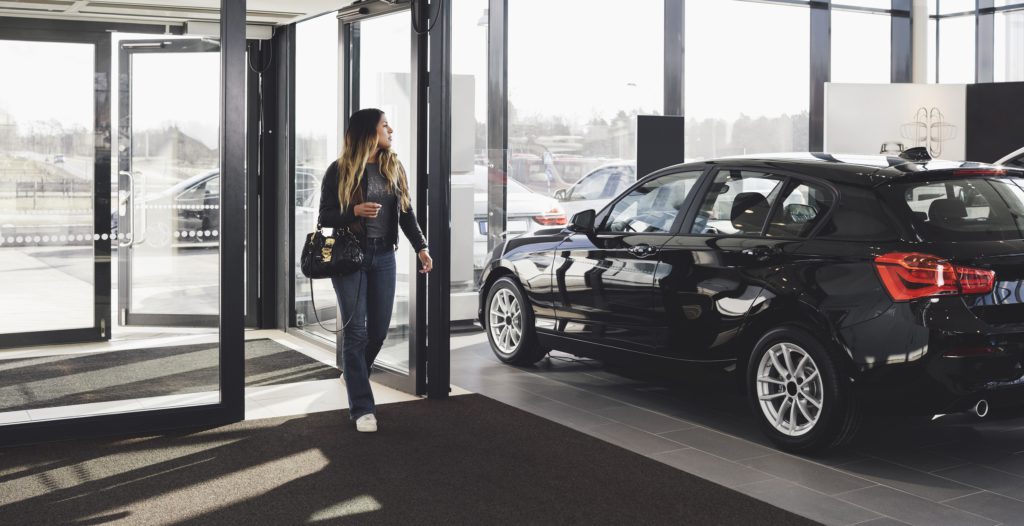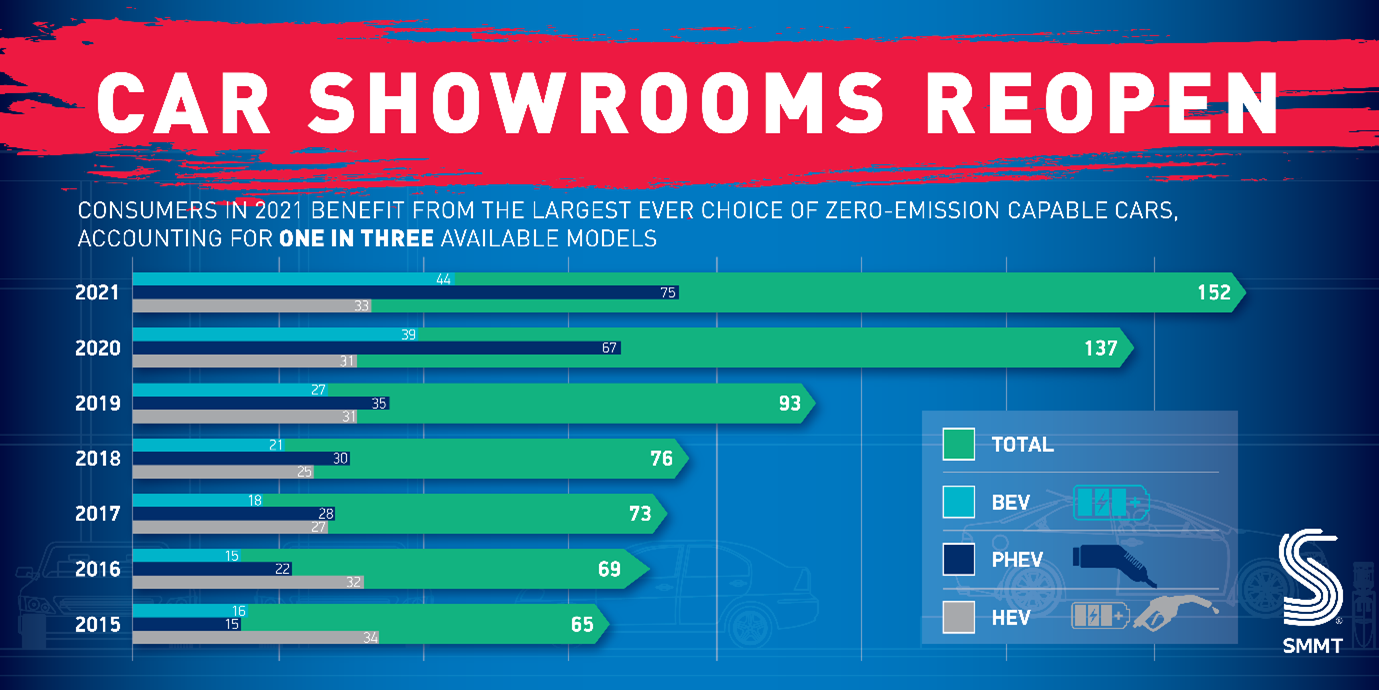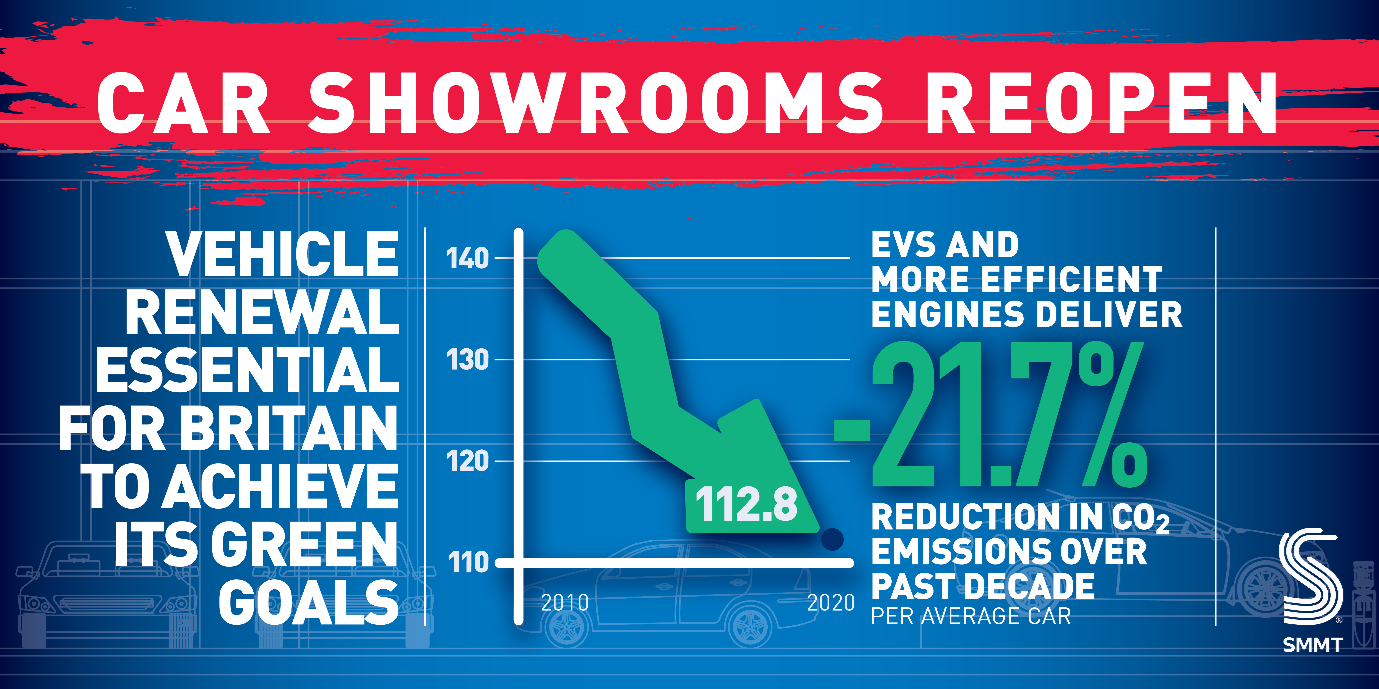Physical dealerships crucial for wide model choice in the UK
14 April 2021

The UK’s Society of Motor Manufacturers and Traders (SMMT) has highlighted the importance of new vehicles for the country’s green goals.
Analysis by the industry body reveals that there are currently around 460 models available to buyers, with 4,650 standard specifications and an almost infinite number of options. This, the SMMT says, gives customers near-limitless choice as showrooms welcome customers back following COVID-19 lockdowns. Dearlerships in the UK reopened on 12 April.
 Source: SMMT
These figures also highlight the importance of physical sales in vehicle choice, with staff on hand to help consumers select the right vehicle for their needs. Dealerships in the UK closed at the start of 2021, although sales did not decline as severely as during the country’s first lockdown in March 2020. During April of last year, registrations fell 97%. The most significant decline in the first four months of 2021 was 39.5% in January, while last month, figures rose 11.5%, albeit against a steep 2020 drop.
′After one of the hardest years in living memory for everyone, reopening showrooms takes the handbrake off UK Auto,’ comments SMMT chief executive, Mike Hawes. ′With the widest and greenest choice of cars ever seen, unleashing pent-up consumer demand can accelerate the industry’s recovery and that of the economy.
′As the automotive sector counts the cost of £22.2 billion lost in turnover during the pandemic, we hope this marks the start of that recovery, as well as giving consumers even more choice for their motoring needs.’
Green choice
The SMMT study also reveals that drivers can now choose from the broadest range of zero-emission cars ever. Electric drivetrains and more efficient engines – especially smaller-capacity turbocharged engines – helped deliver a 21.7% reduction in CO2 emissions per average car over the past decade.
Source: SMMT
These figures also highlight the importance of physical sales in vehicle choice, with staff on hand to help consumers select the right vehicle for their needs. Dealerships in the UK closed at the start of 2021, although sales did not decline as severely as during the country’s first lockdown in March 2020. During April of last year, registrations fell 97%. The most significant decline in the first four months of 2021 was 39.5% in January, while last month, figures rose 11.5%, albeit against a steep 2020 drop.
′After one of the hardest years in living memory for everyone, reopening showrooms takes the handbrake off UK Auto,’ comments SMMT chief executive, Mike Hawes. ′With the widest and greenest choice of cars ever seen, unleashing pent-up consumer demand can accelerate the industry’s recovery and that of the economy.
′As the automotive sector counts the cost of £22.2 billion lost in turnover during the pandemic, we hope this marks the start of that recovery, as well as giving consumers even more choice for their motoring needs.’
Green choice
The SMMT study also reveals that drivers can now choose from the broadest range of zero-emission cars ever. Electric drivetrains and more efficient engines – especially smaller-capacity turbocharged engines – helped deliver a 21.7% reduction in CO2 emissions per average car over the past decade.
 Source: SMMT
New vehicle uptake is therefore crucial to the help the UK reach its emission reduction goals. With every sale of a newer, more efficient model, older, less efficient cars are taken off the road.
The UK is aiming to reduce its carbon emissions in the coming years significantly. It announced that that by 2030, new traditional petrol and diesel vehicles will not be sold, with hybrids, including plug-in hybrid (PHEV) models, banned from 2035. At this time, only zero-emission models, such as battery-electric vehicles (BEVs) and hydrogen fuel-cell electric vehicles (FCEVs), will be available in new-car showrooms.
Challenging year ahead
While showrooms have reopened, the SMMT is not optimistic about new-car sales returning to pre-COVID levels this year.
During the first three months of 2021, registrations were down 37.1% compared to last year. While this number is expected to significantly improve when comparisons to April and May are released, the SMMT states that a new car will have to be handed over every 12 seconds for levels to return to’ normal’.
The automotive industry, which supports 864,000 skilled jobs across the country, has weathered a £22.2 billion (€25.5 billion) loss in turnover from new car registrations since March 2020 and hopes the wide variety of options available will stimulate demand.
Source: SMMT
New vehicle uptake is therefore crucial to the help the UK reach its emission reduction goals. With every sale of a newer, more efficient model, older, less efficient cars are taken off the road.
The UK is aiming to reduce its carbon emissions in the coming years significantly. It announced that that by 2030, new traditional petrol and diesel vehicles will not be sold, with hybrids, including plug-in hybrid (PHEV) models, banned from 2035. At this time, only zero-emission models, such as battery-electric vehicles (BEVs) and hydrogen fuel-cell electric vehicles (FCEVs), will be available in new-car showrooms.
Challenging year ahead
While showrooms have reopened, the SMMT is not optimistic about new-car sales returning to pre-COVID levels this year.
During the first three months of 2021, registrations were down 37.1% compared to last year. While this number is expected to significantly improve when comparisons to April and May are released, the SMMT states that a new car will have to be handed over every 12 seconds for levels to return to’ normal’.
The automotive industry, which supports 864,000 skilled jobs across the country, has weathered a £22.2 billion (€25.5 billion) loss in turnover from new car registrations since March 2020 and hopes the wide variety of options available will stimulate demand.
 Source: SMMT
These figures also highlight the importance of physical sales in vehicle choice, with staff on hand to help consumers select the right vehicle for their needs. Dealerships in the UK closed at the start of 2021, although sales did not decline as severely as during the country’s first lockdown in March 2020. During April of last year, registrations fell 97%. The most significant decline in the first four months of 2021 was 39.5% in January, while last month, figures rose 11.5%, albeit against a steep 2020 drop.
′After one of the hardest years in living memory for everyone, reopening showrooms takes the handbrake off UK Auto,’ comments SMMT chief executive, Mike Hawes. ′With the widest and greenest choice of cars ever seen, unleashing pent-up consumer demand can accelerate the industry’s recovery and that of the economy.
′As the automotive sector counts the cost of £22.2 billion lost in turnover during the pandemic, we hope this marks the start of that recovery, as well as giving consumers even more choice for their motoring needs.’
Green choice
The SMMT study also reveals that drivers can now choose from the broadest range of zero-emission cars ever. Electric drivetrains and more efficient engines – especially smaller-capacity turbocharged engines – helped deliver a 21.7% reduction in CO2 emissions per average car over the past decade.
Source: SMMT
These figures also highlight the importance of physical sales in vehicle choice, with staff on hand to help consumers select the right vehicle for their needs. Dealerships in the UK closed at the start of 2021, although sales did not decline as severely as during the country’s first lockdown in March 2020. During April of last year, registrations fell 97%. The most significant decline in the first four months of 2021 was 39.5% in January, while last month, figures rose 11.5%, albeit against a steep 2020 drop.
′After one of the hardest years in living memory for everyone, reopening showrooms takes the handbrake off UK Auto,’ comments SMMT chief executive, Mike Hawes. ′With the widest and greenest choice of cars ever seen, unleashing pent-up consumer demand can accelerate the industry’s recovery and that of the economy.
′As the automotive sector counts the cost of £22.2 billion lost in turnover during the pandemic, we hope this marks the start of that recovery, as well as giving consumers even more choice for their motoring needs.’
Green choice
The SMMT study also reveals that drivers can now choose from the broadest range of zero-emission cars ever. Electric drivetrains and more efficient engines – especially smaller-capacity turbocharged engines – helped deliver a 21.7% reduction in CO2 emissions per average car over the past decade.
 Source: SMMT
New vehicle uptake is therefore crucial to the help the UK reach its emission reduction goals. With every sale of a newer, more efficient model, older, less efficient cars are taken off the road.
The UK is aiming to reduce its carbon emissions in the coming years significantly. It announced that that by 2030, new traditional petrol and diesel vehicles will not be sold, with hybrids, including plug-in hybrid (PHEV) models, banned from 2035. At this time, only zero-emission models, such as battery-electric vehicles (BEVs) and hydrogen fuel-cell electric vehicles (FCEVs), will be available in new-car showrooms.
Challenging year ahead
While showrooms have reopened, the SMMT is not optimistic about new-car sales returning to pre-COVID levels this year.
During the first three months of 2021, registrations were down 37.1% compared to last year. While this number is expected to significantly improve when comparisons to April and May are released, the SMMT states that a new car will have to be handed over every 12 seconds for levels to return to’ normal’.
The automotive industry, which supports 864,000 skilled jobs across the country, has weathered a £22.2 billion (€25.5 billion) loss in turnover from new car registrations since March 2020 and hopes the wide variety of options available will stimulate demand.
Source: SMMT
New vehicle uptake is therefore crucial to the help the UK reach its emission reduction goals. With every sale of a newer, more efficient model, older, less efficient cars are taken off the road.
The UK is aiming to reduce its carbon emissions in the coming years significantly. It announced that that by 2030, new traditional petrol and diesel vehicles will not be sold, with hybrids, including plug-in hybrid (PHEV) models, banned from 2035. At this time, only zero-emission models, such as battery-electric vehicles (BEVs) and hydrogen fuel-cell electric vehicles (FCEVs), will be available in new-car showrooms.
Challenging year ahead
While showrooms have reopened, the SMMT is not optimistic about new-car sales returning to pre-COVID levels this year.
During the first three months of 2021, registrations were down 37.1% compared to last year. While this number is expected to significantly improve when comparisons to April and May are released, the SMMT states that a new car will have to be handed over every 12 seconds for levels to return to’ normal’.
The automotive industry, which supports 864,000 skilled jobs across the country, has weathered a £22.2 billion (€25.5 billion) loss in turnover from new car registrations since March 2020 and hopes the wide variety of options available will stimulate demand.